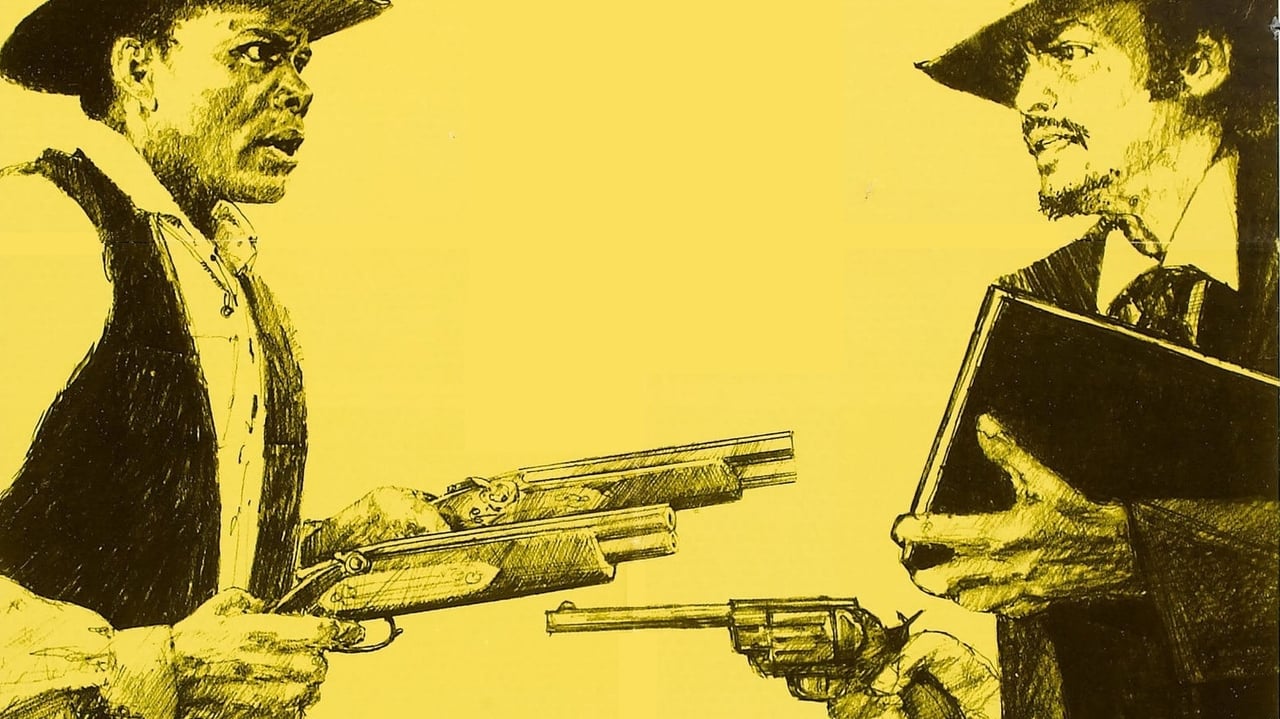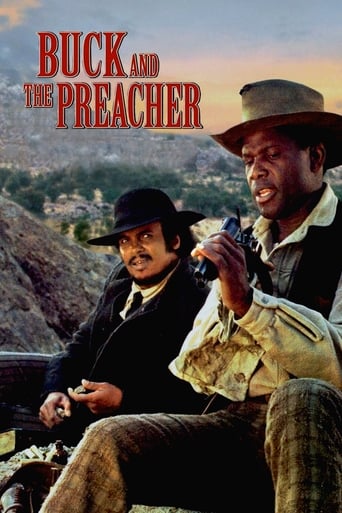

The serio-comic African-American western "Buck and the Preacher," starring Sidney Poitier and Harry Belafonte, certainly wasn't the first black horse opera, but it may reign as the most prestigious. For the record, the earliest known African-American western was a silent movie, "The Crimson Skull" (1922), that dealt with a cowboy who thwarted rustlers by wearing a skeleton costume. Fifty years later, "Buck and the Preacher" came out. Not only does it qualify as a good, entertaining western, director Sidney Poitier and co-star Harry Belafonte sought to make an oater that chronicled the tribulations facing African-Americans who had uprooted themselves from the post-antebellum South and were heading westward to start new lives that had nothing to do with slavery. Cast as a former Union soldier with the rank of sergeant, Buck became a wagon master who escorted freedom seeking slaves to new lands. The conflict in "Buck and the Preacher" grows out of this exodus from Louisiana, and the appointed representatives of those plantations that dispatched desperadoes, such as evil Beau Deshay (Cameron Mitchell of "Garden of Evil"), who gathered a small army to terrorize blacks and compel them to turn back and pick up where they had left off. At one point, one of Beau's relatives who survived told a lawman that an old way of life had to be maintained. The sheriff of Copper Springs (John Kelly of "The Revengers") warns Deshay to 'walk softly' in his town because the migrating blacks are committing any crimes. Instead, the sheriff is intent on hunting down Buck (Sidney Poitier of "Lilies of the Field") and the Reverend Willis Oakes Rutherford (Harry Belafonte of "The World, the Flesh, and the Devil") after they shoot up Copper Springs and rob the bank. Although they are breaking the law, Buck and the Preacher have struggled to recover the money that Deshay's mob has stolen from them. When Buck counts only $157 left over from some fourteen hundred dollars, the Preacher suggests that they rob the bank.Mind you, "Buck and the Preacher" depicts an on-again, off-again friendship between the two eponymous characters. Initially, Buck steals the Reverend's horse because he has ridden his own horse into the ground. Buck is fleeing from Deshay and his rabid gun hands, and Deshay knows that he has been leading the African-American settlers. Buck not only appropriates the Reverend's fresh mount, but he also helps himself to a rabbit roasting over a campfire. The screenplay by Ernest Kinoy, who scripted an earlier Poitier movie "Brother John," slickly pits our two protagonists against each other until they can become as thick as thieves. Deshay and his gun hands encounter the Reverend Rutherford in the hamlet of Frenchman's Ford since they have been trailing Buck's horse. Instead of killing the silver-tongued Reverend, Deshay dangles the prospect of $500 in the Reverend's face for word about the whereabouts of Buck. Eventually, Buck and the Preacher cross trails again, and Buck still doesn't have any use for the garrulous Preacher. Indeed, he believes the Preacher cannot be trusted. The Preacher administers a blow to Buck and rightfully claims his horse. Buck swaps horses before he sets out to lead the newest caravan of pioneers.In case it isn't clear, Deshay and his despicable gun hands are prepared to kill some of the settlers and burn their wagons with their sole possessions in order to turn them around. Eventually, Buck and the Preacher catch up with Deshay and his hooligans. They find these murderous cutthroats in Madame Esther's bordello and a gunfight ensues, with Buck demonstrating the power of his special arsenal of hand guns. Forged by a gunsmith in Fort Leavenworth, Buck wields a pair of heavy calibered weapons. Indeed, he must reload them because they hold only two bullets each, but the wallop that these firearms pack down cut a man down like a scythe. Deshay and most of those around him, aside from his relative Floyd (Denny Miller of "Tarzan, the Ape Man"), die in the gunfight at the bordello. Floyd rides with the sheriff's posse to catch Buck and the Preacher. In a sense, Buck and the Reverend Willis Oakes Rutherford aren't conventional heroes. They are battling not only the villains, but they also contend with a world that treated African-Americans as second-class citizens. "Buck and the Preacher marked Sidney Poitier's debut as a film director. Poitier and Belafonte had hired Joseph Sargent, director of "White Lightning" and "Colossus, the Forbin Project," but Sargent and his two leading actors had a difference of opinion. They fired Sargent, and Columbia Pictures couldn't find a replacement on such late notice, so Poitier took the helm. "Buck and the Preacher" is as western as all get out.
... View MoreFor a while into the movie I thought it might be an all-Black cast Western but that changed when the night riders showed up. There actually was a series of all-Black Westerns back in the late Thirties starring cowboy crooner Herb Jeffries, who's singing sounded as good as guys like Gene Autry. My favorite Jeffries flick is "Two Gun Man From Harlem" but I haven't seen them all yet. One name I was surprised to catch in this film's credits was that of Clarence Muse as the old black fortune teller Cudjo. He had a lot of roles portraying dignified black characters in the Thirties and Forties, and since I brought it up I had to take a look, but he didn't appear in any pictures with Herb Jeffries.Sidney Poitier and Harry Belafonte team up in this one following a less than friendly first impression between their characters. Poitier is wagon master Buck, leading freed black slaves across the West to destinations they might call home following the end of the Civil War. Preacher Willis Oaks Rutherford is more of an opportunist than a Man of God, but he did have the Bible thing down pretty well when he needed it. Who was going to argue with the Reverend of the High and Low Order of the Holiness Persuasion Church.As a revisionist Western this one works to show a different side of the Old West experience though it doesn't set any new standards by my estimation. The inclusion of the Indian tribe on the side of the black settlers was an interesting element, helping them out in the final shoot out against the night riders even after stating they wouldn't get involved. After that, the wagon settlers make it to a fertile land completing their Westward trek, but done in such an abrupt fashion that one wonders if the ending had any kind of thought put into it.
... View MoreI don't understand how someone could classify this film as a "comedy". It did have it's comedic moments, but no more than any other Western or Drama. Then that false comment ends up on the front page of the IMDb? Weird. This was a first rate Western by any standard. At a time when Hollywood had no interest in making such films. Blaxploitation films and comedies were the rules of the day. Poitier makes a great cowboy and fine director here. I suspect the reason this film is/was not more popular is that there were so few good guys of the White persuasion. The one fair and honest White man was the town Sheriff, who was quickly killed off by another White man for this very reason.
... View MoreSidney Poitier made his directorial debut with "Buck and the Preacher", in which he played a wagon-master leading freed slaves across the Old West. The whole time, they have to battle night-riders trying to return them to slavery in Louisiana. But then, Poitier joins up with Harry Belafonte, a reformed thief spreading the Gospel across the Old West, and they figure out a way to protect the freed slaves.Probably the most important aspect of this movie was that it came out around a time when Hollywood was releasing many blaxploitation movies portraying African-Americans as kick-ass brothers and sisters with hearts of gold. This one focused seriously on a part of black history in the United States, and did a very good job at it. I certainly recommend this movie. Also starring Ruby Dee and Denny Miller (a character actor who appeared twice on "Gilligan's Island").
... View More